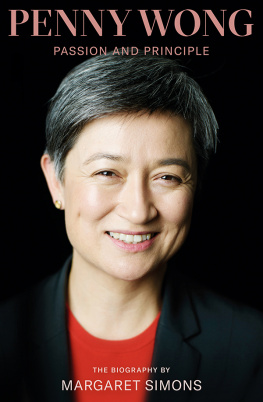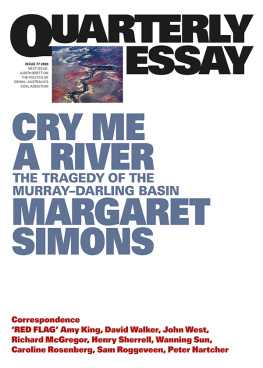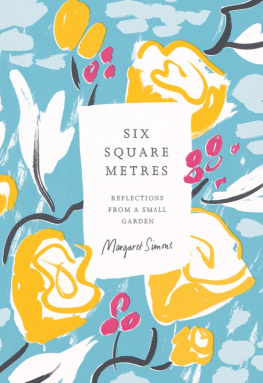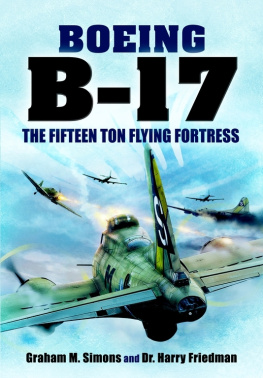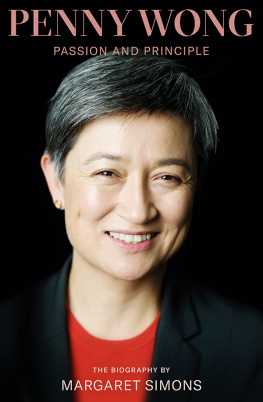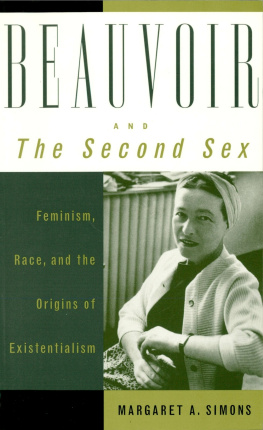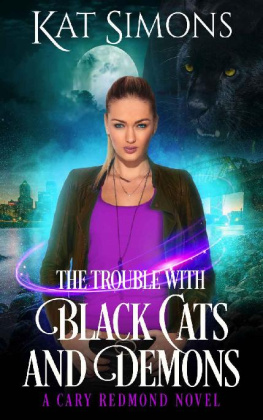Margaret Simons - Penny Wong: Passion and Principle
Here you can read online Margaret Simons - Penny Wong: Passion and Principle full text of the book (entire story) in english for free. Download pdf and epub, get meaning, cover and reviews about this ebook. year: 2019, publisher: Schwartz Books Pty. Ltd., genre: Non-fiction. Description of the work, (preface) as well as reviews are available. Best literature library LitArk.com created for fans of good reading and offers a wide selection of genres:
Romance novel
Science fiction
Adventure
Detective
Science
History
Home and family
Prose
Art
Politics
Computer
Non-fiction
Religion
Business
Children
Humor
Choose a favorite category and find really read worthwhile books. Enjoy immersion in the world of imagination, feel the emotions of the characters or learn something new for yourself, make an fascinating discovery.
- Book:Penny Wong: Passion and Principle
- Author:
- Publisher:Schwartz Books Pty. Ltd.
- Genre:
- Year:2019
- Rating:5 / 5
- Favourites:Add to favourites
- Your mark:
- 100
- 1
- 2
- 3
- 4
- 5
Penny Wong: Passion and Principle: summary, description and annotation
We offer to read an annotation, description, summary or preface (depends on what the author of the book "Penny Wong: Passion and Principle" wrote himself). If you haven't found the necessary information about the book — write in the comments, we will try to find it.
Penny Wong: Passion and Principle — read online for free the complete book (whole text) full work
Below is the text of the book, divided by pages. System saving the place of the last page read, allows you to conveniently read the book "Penny Wong: Passion and Principle" online for free, without having to search again every time where you left off. Put a bookmark, and you can go to the page where you finished reading at any time.
Font size:
Interval:
Bookmark:
Acknowledgements
A book like this incurs many debts of gratitude for its author. First, I would like to thank Senator Penny Wong for her cooperation, despite her antipathy to the idea of the book and the near certainty that she will not be entirely happy with the result. I would also like to thank or perhaps apologise to her family, who have had to put up with the slipstream from a project they did not welcome.
Also to be thanked are Senator Wongs staff, both for practical assistance and for their forbearance and wisdom.
I am indebted to those who agreed to be interviewed, as acknowledged in the list of interview subjects, and to those who gave of their time and perspectives but asked not to be identified.
Ken Haley compiled fearsome books of clippings for me at the beginning of this project, and assisted with fact-checking and chasing down elusive bits and pieces towards the end. Gary Dickson was, as always, assiduous in tracking down information and sorting my references. Natasha Sim visited the archives for me in Sabah, Malaysia.
Thanks are due to the staff of the State Library of South Australia, the University of Adelaide archives, Mr Ramlin Alim at the Sabah State Archives, the researchers at Genealogy SA and Mr Alex Pouwbray, archivist at Scotch College, Adelaide. Thanks, as well, to the staff of Coromandel Valley Primary School and Scotch College for the tours and insights they gave me.
I am indebted to Judith Ajani, Maryanne Slattery and Allan Behm for commenting on drafts of relevant chapters. Ramona Koval and Denis Muller helped by reading proofs.
My colleagues in the School of Media, Film and Journalism at Monash University were consistently understanding and supportive. My family are now experienced in putting up with book projects. They are very good at it, and I thank them.
My agent, Lyn Tranter, looked after my interests with characteristic skill and judgement. Finally, thanks to Aviva Tuffield, who pestered me to do this book in the first place, and to the team at Black Inc.: as always, Chris Feik, and particularly Julia Carlomagno, who saw the project through to completion with care and patience.
Any errors or misjudgements are, of course, entirely my responsibility.

Margaret Simons is an award-winning journalist and the author of thirteen books, including a biography of Malcolm Fraser that won the Book of the Year and the Douglas Stewart Prize at the 2011 NSW Premiers Literary Awards. She is the recipient of the 2015 Walkley Award for Social Equity Journalism and has been honoured with several Quill Awards for Journalistic Excellence. Simons is an associate professor in the School of Media, Film and Journalism at Monash University, and a board member of the Public Interest Journalism Initiative.

KINDRED OFFSPRING
W hen Penny Wong was twelve, she wrote a poem about a shark. She was a good poet for her age: that year she had two verses in the magazine of Adelaides Scotch College the wealthy private school that she attended on a scholarship.
Wong had arrived in Adelaide from Sabah, Malaysia, in spring 1976, when she was eight. The reason for the move the break-up of the marriage between her Adelaide-born mother and Chinese-Malaysian father was traumatic enough. But coming to Australia, it was as though she had moved to another planet from the embracing, humid warmth of the city of Kota Kinabala, the capital of the state of Sabah, to an ordinary suburban house in Coromandel Valley, in the Adelaide Hills. Even though it was coming on summer, in the driest city in the driest state on the driest continent in the world, Wong often felt cold. Australia smelled dusty. It just looked different and smelled different, and the light was different, she has recalled. I remember the first time I jumped into the sea here, and how cold it was and me thinking, whats wrong with the sea?
In the new year, Penny and her younger brother, Toby, were enrolled at Coromandel Valley Primary School. As they followed their mother across the asphalt to the office to fill out the paperwork, students formed a crowd around them. They were saying What is she? and someone said, Shes Hong Kong-ese I realised for the first time that my race was something that other people would notice. That it was an issue.
Today she is spare of speech when talking about the bullying she experienced at primary school. Partly it is because she doesnt like to remember how it felt. Partly its because I dont like to repeat words of hate.
By the time she moved to Scotch College, she had adopted a mantle of toughness. She had navigated the difference between Adelaide and Kota Kinabala, between who she was a clever, quiet girl with a fiercely guarded internal life and who she had to be. I did it by trying to be better than the people who were teasing me, so I have no doubt I became much more focused on studying, getting good marks, doing well on the sporting field, those sorts of things. I decided I was going to be better than them, and achieve in this field, and this field, and this field. I was trying to prove that I could succeed no matter what they said to me, and no matter what they thought of me. That I could do well no matter what they threw at me. It wasnt so much to get people to like me, to become my friend; it was that I wasnt going to allow them to keep me down.
I didnt become insular. Ive seen that happen with kids, but that wasnt my response. I just pretended to be confident, even when I wasnt. I learned to be steady and still, even when it felt very messy and difficult. You know, to hold yourself steady, even if your reactions are really strong and your emotions confused.
And so she wrote about the shark.
Beginning a biography of a politician with an evocation of a shark may seem provocative. The clich demands we think of predators. That is not the intended implication here. What makes Penny Wongs childhood poem significant in retrospect is not that her subject is at the top of the food chain, but her admiration for the creatures strength, its sleekness, the way it is adapted to and moves cleanly through its environment the way it inspires both fear and respect.
These are the words applied again and again to Wong, both by friends and enemies. She is clever. She can be politically aggressive, and ruthless, though it is rarely, if ever, personal. She is forensic, but also emotional relatively easily moved to tears and to anger. She is hypervigilant for prejudice, for attempts to demean her, and more generally for persecution of the powerless. She is different.
The nature of that difference the nature of the woman behind the carefully curated public image is one of the questions motivating this biography. Indeed, it is the justification for pursuing the book despite her objections. Penny Wong is now the undisputed intellectual leader of the Left faction of Australias alternative government. She is an important friend and ally of the leader, Anthony Albanese. Other contenders for that title are seen as less politically adroit.
She may yet become our foreign minister at the most challenging time in recent decades arguably in Australias history. Until then, she will be shadow foreign minister and leader of Labor in the Senate the latter role chiefly responsible for managing Labors relationships with the Greens and the crossbench when the government doesnt have the numbers to pass legislation in its own right. Navigating all this is more than a management job. It demands both policy detail and a big picture, to adapt Paul Keatings phrase. It requires political aggression, yet also restraint when the national interest demands it. It requires leadership and people skills.
Next pageFont size:
Interval:
Bookmark:
Similar books «Penny Wong: Passion and Principle»
Look at similar books to Penny Wong: Passion and Principle. We have selected literature similar in name and meaning in the hope of providing readers with more options to find new, interesting, not yet read works.
Discussion, reviews of the book Penny Wong: Passion and Principle and just readers' own opinions. Leave your comments, write what you think about the work, its meaning or the main characters. Specify what exactly you liked and what you didn't like, and why you think so.

